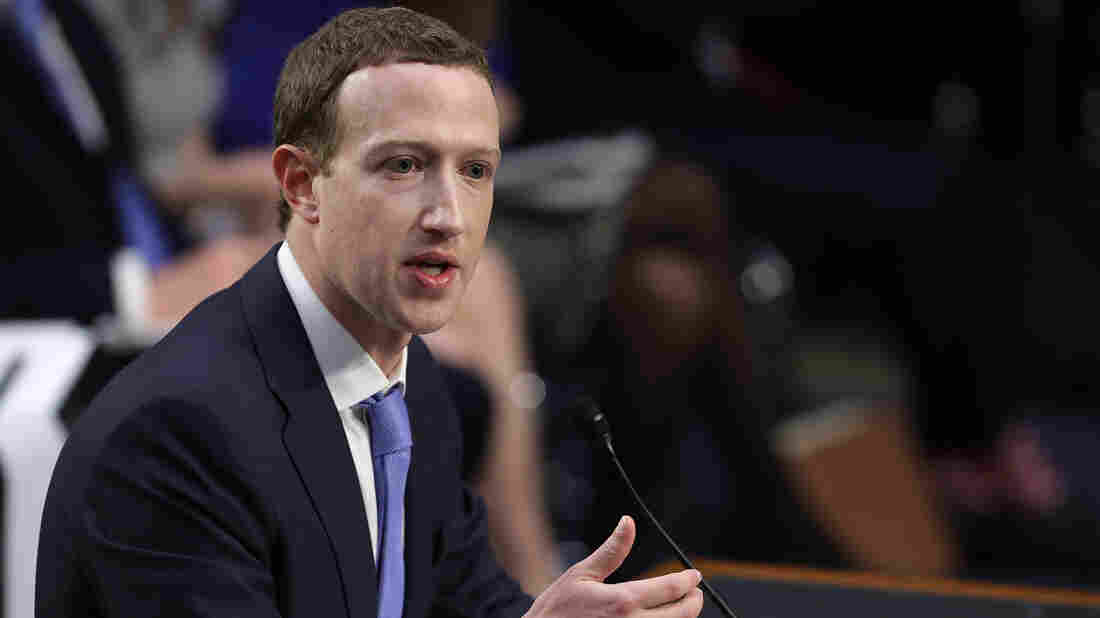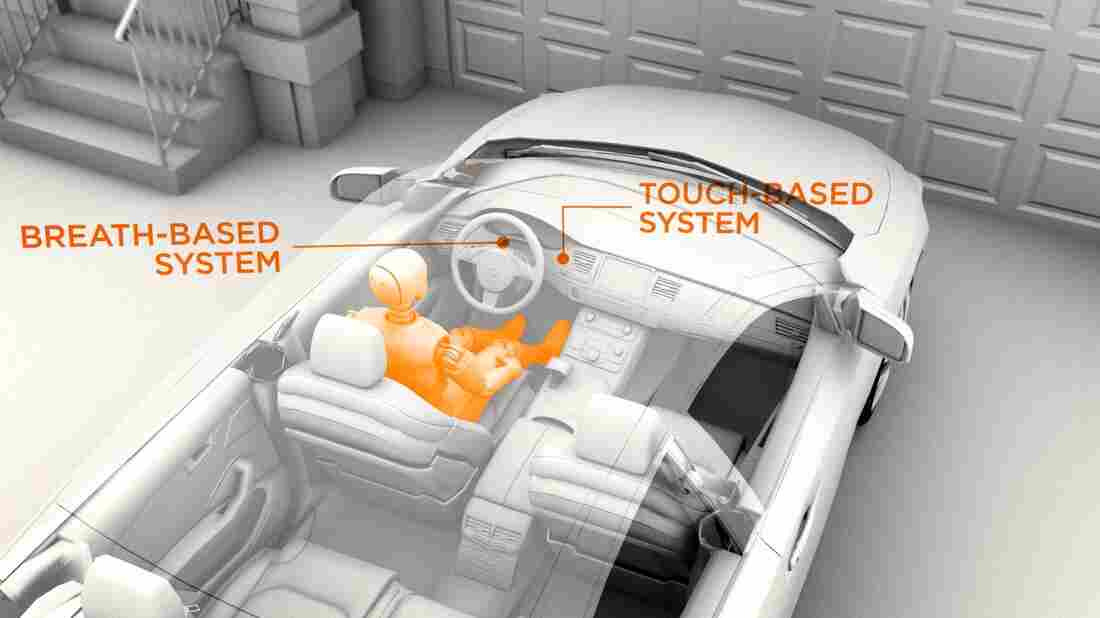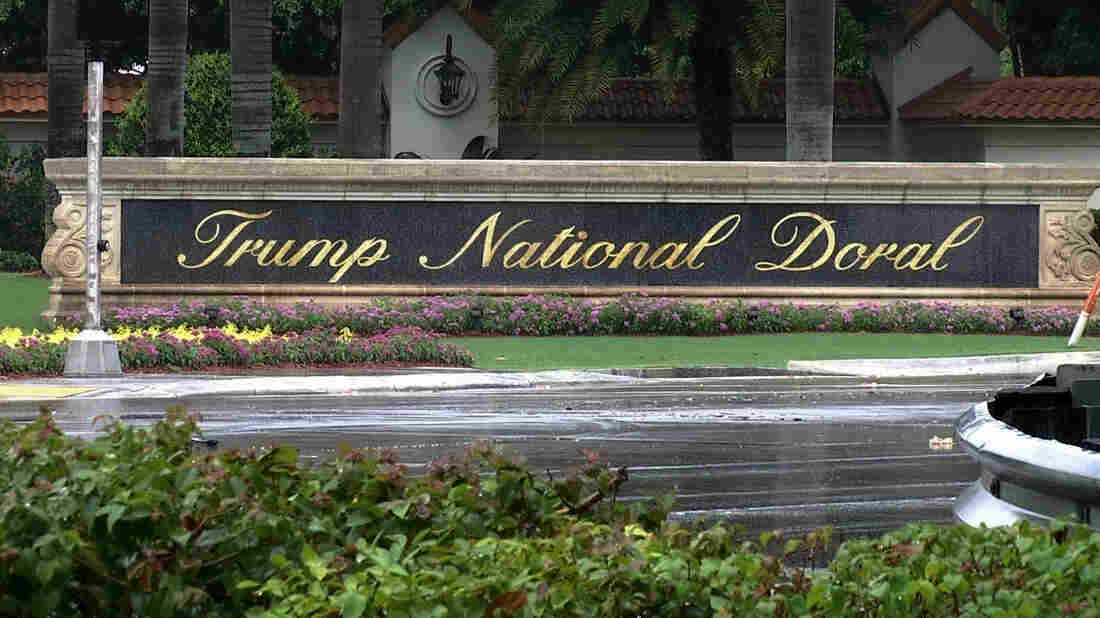
Facebook CEO Mark Zuckerberg is scheduled to appear before the House Financial Services Committee on Wednesday. He’s likely to face a broad range of questions about his company’s influence.
Chip Somodevilla/Getty Images
hide caption
toggle caption
Chip Somodevilla/Getty Images
Mark Zuckerberg says it’s Facebook’s way — or China’s way.
Facebook’s founder and CEO will tell Congress that the social network’s controversial digital currency project, Libra, is essential to projecting American leadership around the world.
He will warn that any delay risks losing that leadership to China, according to prepared remarks released ahead of a House Financial Services Committee hearing on Wednesday.
“While we debate these issues, the rest of the world isn’t waiting. China is moving quickly to launch similar ideas in the coming months,” Zuckerberg will say.
“I believe [Libra] will extend America’s financial leadership as well as our democratic values and oversight around the world. If America doesn’t innovate, our financial leadership is not guaranteed.”
Zuckerberg frequently invokes China as a rival to American technology supremacy, and American values.
Last week in a speech at Georgetown University in Washington, he warned that calls for Facebook to exercise more limits on what people can and can’t say on its platform endangered its commitment to free speech — and America’s global influence.
“Until recently, the Internet in almost every country outside China has been defined by American platforms with strong free expression values. There’s no guarantee these values will win out,” he said.
Zuckerberg is back in the Capitol Hill hot seat as Facebook faces immense pressure over how much influence it has over the lives of its more than 2 billion users.
Members of Congress will seize the opportunity to grill him about a whole host of topics.
Here are five questions he could face in the hearing room.
Is Facebook really going to launch a currency?
Facebook says Libra would let users around the world — especially those without traditional bank accounts — send money as easily as sending a text message. And while the project was originally Facebook’s idea, it is meant to come to life with the help of 27 founding partners, including financial services companies.
But Libra hit hurdles as soon as it was announced. Regulators around the world have taken a dim view of the project, sounding fears that it could pose a threat to financial stability and be used to fund terrorism and other illegal activities.
In recent weeks, several of the initial partners backed away — including the credit card companies Visa and MasterCard and the digital payment firms PayPal and Stripe. People close to some of the companies that have dropped out told NPR they were concerned about angering regulators, given that they already operate in highly regulated industries.
Their departures have left some analysts doubting that the project can go forward.
“Libra sounds dead on arrival,” said Michael Pachter, an equities analyst at Wedbush Securities. “I don’t think Facebook can pull it off without the support of all the different banking and credit card processors and payment processors. I just don’t think that they have the wherewithal to actually do it themselves.”
In his prepared remarks, Zuckerberg acknowledged that Facebook is “not the ideal messenger right now. We’ve faced a lot of issues over the past few years, and I’m sure people wish it was anyone but Facebook putting this idea forward.”
And he said Libra will not be launched “anywhere in the world unless all US regulators approve it.”
Has Facebook done enough to stop discrimination in advertising?
Housing is the other headline subject of Wednesday’s hearing. Facebook has been hit with a federal lawsuit by the Department of Housing and Urban Development for allegedly enabling housing discrimination.
The allegations stem from Facebook’s ad targeting tools. The company lets advertisers select who can and cannot see ads, based on a range of different categories.
“Facebook is discriminating against people based upon who they are and where they live,” in violation of the Fair Housing Act, HUD Secretary Ben Carson said when the suit was filed in March.
The company has also been accused of allowing age and gender discrimination in job ads.
Nicol Turner Lee, a fellow at the Brookings Institution’s Center for Technology Innovation who studies access to technology, said Facebook may not have intended its advertising tools to be used this way.
But she said Internet platforms need to take more care to consider the consequences of the technologies they build.
“We have to ask ourselves, are companies like Facebook clear about the guardrails that are protecting human and civil rights, and the extent to which they’re building products and services that comply with those laws?” she said.
Facebook has stopped letting advertisers target ads for housing, jobs and credit to people based on their ethnic group, gender, age or zip code.
On Tuesday it pledged $1 billion toward affordable housing in California.
In Zuckerberg’s prepared remarks, he said Facebook is taking “a broader view of our responsibility. That includes making sure our services are used for good and preventing harm. People shouldn’t be discriminated against on any of our services.”
Why won’t Facebook stop politicians from lying?
Facebook’s latest firestorm is also about advertising.
Critics are furious about the social network’s policy of allowing politicians to publish misleading or downright untrue posts and ads on its platform. Zuckerberg will likely be pressed about this topic again on Wednesday.
Facebook says its policy flows from its commitment to free speech. It says it does not want to judge whether political speech is true or not, and that users should be free to hear from politicians and make up their own minds.
Zuckerberg strongly defended this position in his Georgetown speech last week, positioning Facebook as a champion of free expression and reiterating that his company should not be the arbiter of truth.
“While I certainly worry about an erosion of truth, I don’t think most people want to live in a world where you can only post things that tech companies judge to be 100% true,” he said.
But that has not satisfied critics. Democratic presidential candidate Sen. Elizabeth Warren of Massachusetts ran her own deliberately false Facebook ad to protest the policy. In it, she incorrectly claimed Facebook and Zuckerberg had endorsed President Trump.
“Once again, we’re seeing Facebook throw its hands up to battling misinformation in the political discourse, because when profit comes up against protecting democracy, Facebook chooses profit,” Warren tweeted in explanation of her ad.
In his Georgetown speech, Zuckerberg said he had considered dropping political advertising altogether — noting that it contributes just a tiny fraction of Facebook’s billions of dollars in annual sales. But he argued that could have the effect of favoring incumbents and candidates favored by the media.
What is Facebook doing to prevent the 2020 election from being a repeat of 2016?
With U.S. intelligence agencies warning that foreign governments may try to influence American politics leading up to next year’s election, lawmakers may want to know how Facebook is defending its platform from manipulation.
Zuckerberg gave an update about Facebook’s election security efforts on Monday. That included a number of new features and updates to existing policies to provide more transparency about who is posting on Facebook.
For example, the site will now labeling content from media outlets it considers to be “state-controlled,” which Facebook defines as “wholly or partially under the editorial control of their government.”
But the scope of the problem Facebook must confront was also highlighted on Monday when the company said it had taken down four more networks of fake accounts. Facebook said it has removed more than 50 such networks, which could attempt to manipulate its users, in the past year.
Three of the newly disabled networks were tied to Iran, while the fourth originated in Russia and showed some links to the Internet Research Agency, the Kremlin-backed troll farm involved in political interference in 2016, Facebook said.
Zuckerberg told reporters on Monday that election security “is one of my top priorities for the company” and that Facebook is no longer “on our back foot” when it comes to identifying fake accounts.
Is Facebook too powerful?
Congress is not the only branch of government asking tough questions about Facebook. The Federal Trade Commission, the Department of Justice and a group of 47 state attorneys general are all investigating Facebook for potential antitrust violations.
The state prosecutors are “concerned that Facebook may have put consumer data at risk, reduced the quality of consumers’ choices, and increased the price of advertising,” New York Attorney General Letitia James said Tuesday.
Some critics are calling for the company to be broken up, or for its acquisitions of Instagram and WhatsApp to be unwound. Warren has made the breakup of Facebook — along with Google and Amazon — a key part of her campaign platform.
Some tech veterans agree. Marc Benioff, the CEO of software company Salesforce, told CNN that Facebook is “addictive” and has too much control of users’ data — and therefore should be broken up. “They’re having an undue influence as the largest social media platform on the planet,” he said.
And even a Facebook co-founder has turned on the company. Chris Hughes, who was one of Zuckerberg’s roommates at Harvard, launched a $10 million anti-monopoly fund to support policy, academic research and organizing to take on corporate power in tech and other industries.
Zuckerberg bristles at the idea of breaking up his company. In leaked audio from staff meetings this summer, obtained by the website The Verge, the CEO said Facebook would “fight” any effort to do so and expected to win any legal challenge.
At Georgetown last week, Zuckerberg acknowledged criticism of big tech — but deflected the argument.
“I understand the concerns that people have about how tech platforms have centralized power. But I actually believe the much bigger story is how much these platforms have decentralized power by putting it directly into people’s hands,” he said.
Editor’s note: Facebook is among NPR’s financial supporters.
Let’s block ads! (Why?)








